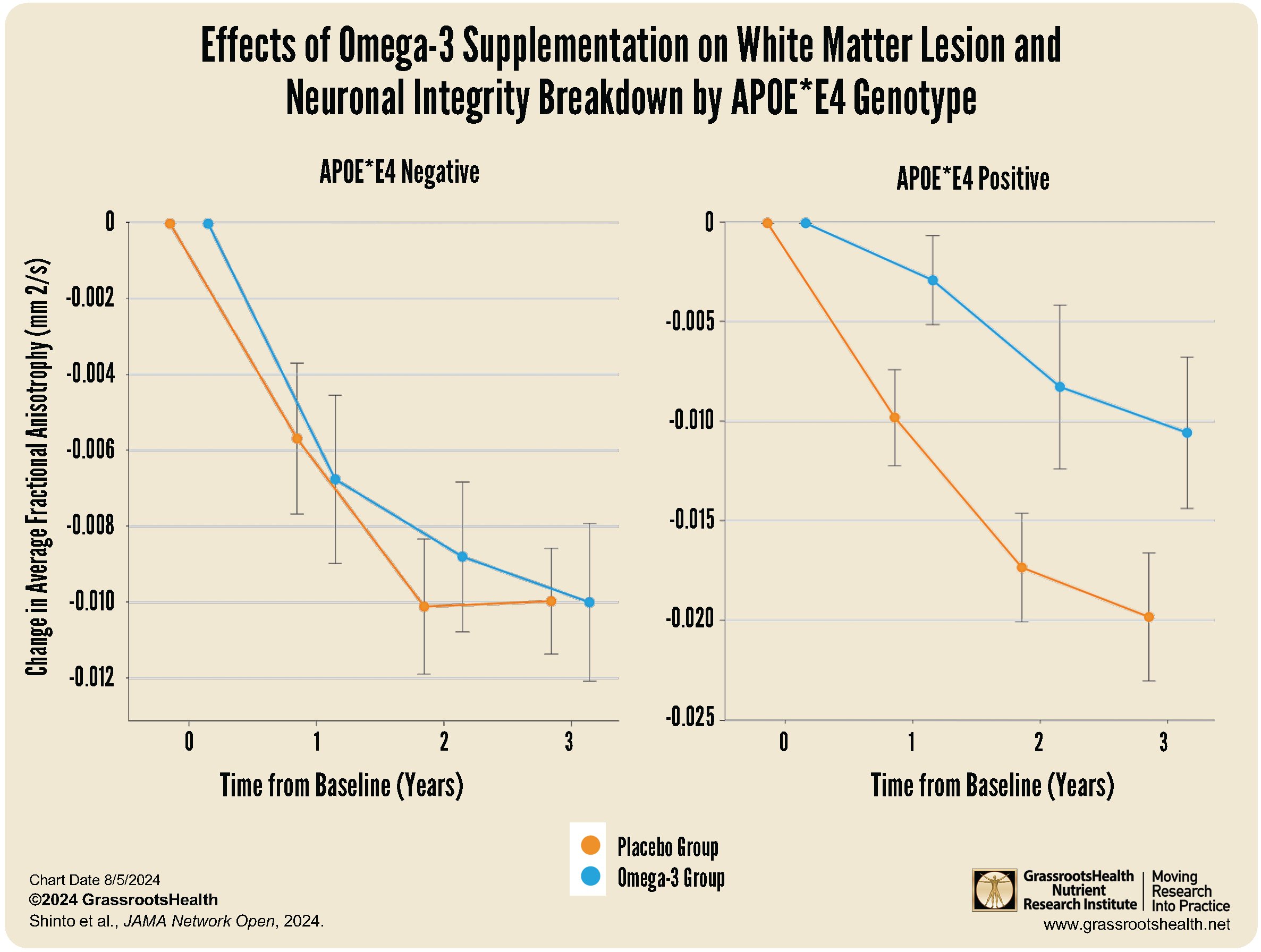OHSU clinical trial finds statistically significant benefit for those genetically predisposed to Alzheimer’s
Key Points
- A new study found that fish oil supplementation among those who carry a gene associated with Alzheimer’s disease is associated with a reduction in the breakdown of nerve cells in the brain, suggesting that older adults with a genetic predisposition to Alzheimer’s disease may benefit from fish oil supplements
- In the study, half of the participants took omega 3-enriched fish oil supplements each day while half took a soybean-based placebo; MRI scans showed that among APOE4 carriers there was a dramatic reduction in the breakdown of brain cell integrity as soon as one year after treatment with the fish oil, compared with the soybean oil group
 Portland, Oregon, August 1 (OHSU) — A clinical trial at Oregon Health & Science University suggests that a subset of older adults with a genetic predisposition to Alzheimer’s disease may benefit from fish oil supplements.
Portland, Oregon, August 1 (OHSU) — A clinical trial at Oregon Health & Science University suggests that a subset of older adults with a genetic predisposition to Alzheimer’s disease may benefit from fish oil supplements.
The study published today in the journal JAMA Network Open.
The results come amid claims that fish oil supplements can improve brain function in people with memory problems. The study found no statistically significant benefit for all older adults in general. However, among those enrolled in the study who also carry a gene associated with Alzheimer’s disease, it showed a reduction in the breakdown of nerve cells in the brain.
The study’s senior co-author from OHSU indicated that fish oil may be worthwhile for people who carry the APOE4 gene, which indicates a higher risk of developing Alzheimer’s, but not necessarily for all older adults.
“Our findings showed that over three years, there was not a statistically significant difference between placebo and the group that took fish oil,” said Lynne Shinto, N.D., M.P.H., professor of neurology in the OHSU School of Medicine. “I don’t think it would be harmful, but I wouldn’t say you need to take fish oil to prevent dementia.”
The study enlisted 102 participants who were 75 years old or older who had relatively low blood levels of omega-3 fatty acids, which are found in fish oil. Participants underwent magnetic resonance imaging, or MRIs, of their brains first as they were enrolled and then again at the conclusion of the three-year study, to assess the amount of change in white matter lesions in the brain. These lesions may inhibit the delivery of nutrients through blood vessels to the brain, which raises the risk of developing dementia later in life.
Participants enrolled in the study had relatively high levels of white matter lesions but were otherwise healthy, with no dementia.
Half of the participants took omega 3-enriched fish oil supplements each day while half took a soybean-based placebo. The two MRIs measuring the degree of white matter lesions at the beginning and end of the study period found a slight reduction in the progression of these lesions — but not enough to be statistically significant between the two groups.
Among APOE4 carriers, however, researchers measured a dramatic reduction in the breakdown of brain cell integrity as soon as one year after treatment with the fish oil, compared with the soybean oil group.
“This is the first dementia prevention trial to use modern prevention tools, such as a blood test and brain scan, to identify not only people at high risk for dementia, but also those well-suited to receive a specific nutritional intervention,” said Gene Bowman, N.D., M.P.H., director of clinical trials and instructor of neurology at the McCance Center for Brain Health, Massachusetts General Hospital and Harvard Medical School.
“The fact that neuronal integrity breakdown was slowed in people randomized to omega-3 treatment who are also at high risk for Alzheimer’s disease is remarkable, and warrants a larger clinical trial in more diverse populations in the future.”
Bowman previously worked at OHSU, where the clinical trial was conducted.
In addition to Shinto and Bowman, co-authors from OHSU include Charles F. Murchison, Ph.D., Lisa C. Silbert, M.D., MCR, Hiroko H. Dodge, Ph.D., David Lahna, M.S., William Rooney, Ph.D., Jeffrey Kaye, M.D., and Joseph F. Quinn, M.D.
The study was supported by the National Institute on Aging of the National Institutes of Health grant awards R01AG043398, P30AG008017 and P30AG066518; the National Center for Advancing Translational Sciences of the NIH award to the Oregon Clinical and Translational Research Institute at OHSU, grant award UL1TR002369; and the NIH Office of the Director, grant awards S10OD021701, S10OD018224 and S10OD016356 for shared instruments housed in OHSU’s Advanced Imaging Research Center. The content is solely the responsibility of the authors and does not necessarily represent the official views of the NIH.
Measure Your Levels Today
Create your custom home blood spot kit to help determine if you are getting enough of the following nutrients shown to benefit overall health, along with other measures, including:
 Vitamin D
Vitamin D- Omega-3 Index plus Omega-3:Omega-6 and AA:EPA Ratios
- Magnesium (plus Zinc, Copper, Selenium, Lead, Cadmium & Mercury)
- hsCRP
- HbA1c
- Type 1 Diabetes Autoantibodies
- TSH
Enroll and test your levels today, learn what steps to take to improve your status of omega-3s, vitamin D and other nutrients and blood markers, and take action! By enrolling in the GrassrootsHealth projects, you are not only contributing valuable information to everyone, you are also gaining knowledge about how you could improve your own health through measuring and tracking your nutrient status, and educating yourself on how to improve it.


 Vitamin D
Vitamin D